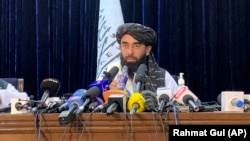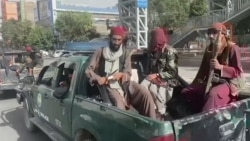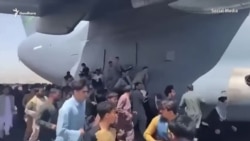As part of a public relations offensive meant to prove to the world and its own fearful population that the fundamentalist group has changed, the Taliban has pledged to observe women's rights, to provide an amnesty to those who fought them, and to prevent Afghanistan from being used as a launchpad for terrorist attacks.
Meanwhile, a huge international airlift of foreigners and Afghans who worked with them continued on August 17 after evacuation flights were interrupted at Kabul airport a day earlier when thousands of scared Afghans swarmed the airfield in a desperate attempt to flee the country.
In Kabul, the streets remained quiet for another day as the Taliban patrolled and many residents stayed home and shops closed.
In the first official news conference in Kabul since the group's shock seizure of the capital on August 15, Taliban spokesman Zabihullah Mujahid said the militants wanted peaceful relations with other countries and said women would be allowed to work and study and "will be very active in society but within the framework of Islam."
"We don't want any internal or external enemies," said Mujahid, who had been a shadowy figure for years.
Not using Afghanistan as a launching pad for terrorist attacks against the United States and other countries is a key demand in a deal the militants struck with the administration of U.S. President Donald Trump last year that led to the ultimate U.S. withdrawal under current President Joe Biden.
With the Taliban firmly in power, Western powers face the decision whether to deal with the Islamist insurgents they had fought for nearly two decades.
"It will be up to the Taliban to show the rest of the world who they are and how they intend to proceed," Jake Sullivan, the White House national-security adviser, told reporters.
"Their track record has not been good but it's premature to address that question," Sullivan said of recognition.
In Brussels, the European Union's foreign policy chief, Josep Borrell, said the bloc will have to talk to the Taliban after the group seized control of Afghanistan.
"The Taliban have won the war, so we will have to talk with them," Borrell said after chairing a meeting of EU foreign ministers, while stressing this does not mean moving quickly to officially recognize their rule.
But Borrell said the EU was suspending payments of development assistance to Afghanistan, while weighing whether to boost humanitarian aid to the conflict-ravaged country.
Borrell said there can be "no payments of development assistance until we clarify the situation" with Taliban leaders, warning that the Taliban must respect UN Security Council resolutions and human rights to earn access to the funds.
In Britain, Foreign Secretary Dominic Raab said that "ordinarily" London would not deal with the Taliban due to its human rights standards.
But with talks still under way in Qatar on a more inclusive government, "we want to test whether there is scope to moderate the kind of regime that we will now see in place."
"They are now in power, and we now need to deal with that reality and we now have to be optimistic about it," Raab told Sky News.
NATO Secretary-General Jens Stoltenberg warned the Taliban that it cannot allow Afghanistan to once again become a breeding ground for terrorism.
"Those now taking power have the responsibility to ensure that international terrorists do not regain a foothold," Stoltenberg told a news conference.
Stoltenberg said that although NATO had withdrawn its forces from Afghanistan, the alliance will remain on alert for signs that terrorist groups are regrouping there and could strike from a distance.
The Taliban has announced a general "amnesty" for all in Afghanistan, saying the country needs the talents of its people to rebuild and function.
Mujahid promised Afghans the amnesty would also apply to those who opposed the Taliban.
He said that those who worked as interpreters and translators for the U.S.-led forces will not be targeted and can return or stay in Afghanistan, including those who are currently at the Kabul airport waiting to leave the country.
Answering a question about negotiations to form a new government, Mujahid said the Taliban has been in touch with negotiators Abdullah Abdullah, the head of the Afghan National Reconciliation Council, and former President Hamid Karzai; as well as Gulbudin Hekmatyar, the leader of Hizb-e Islami political and paramilitary group.
The Taliban wants an inclusive government, but within the values of Islam, he said.
Meanwhile, the United States sent military reinforcements to protect the evacuation of foreigners and vulnerable Afghan civilians, with troop numbers swelling to 4,000 on August 17.
In Washington, Sullivan said the Taliban had told the United States it will provide safe passage for civilians to reach the airport.
Sullivan told a White House news briefing the United States believes the Kabul evacuation can go until August 31 and it is talking to the Taliban about the exact timeline and how it will play out.
Major General Hank Taylor, a top military official, said Washington aimed to increase its airlift to one aircraft an hour so that between 5,000 and 9,000 passengers could be carried out per day.
European countries are also evacuating their citizens and Afghans who worked alongside them, in addition to others such as journalists and human rights activists deemed at risk.
Kabul was the last major city in Afghanistan to hold out against a Taliban offensive that accelerated in the space of days as they rapidly gained control of territory across the country.
The Taliban's co-founder, meanwhile, returned to Afghanistan on August 17. Mullah Abdul Ghani Baradar arrived in Kandahar -- the group's birthplace -- from Qatar, where he has spent months leading talks with the United States and then Afghan peace negotiators.
The UN Security Council on August 16 called for talks to create a new government in Afghanistan after Secretary-General Antonio Guterres warned of "chilling" curbs on human rights and violations against women and girls.
Karzai and Abdullah were set to travel to Qatar on August 17 to meet with Taliban representatives and discuss the future of Afghanistan.
However, a source in the Supreme National Reconciliation Council of Afghanistan who did not want to be named told RFE/RL that the visit had been delayed. The source did not give any reason for the delay.
With reporting by AFP, AP, Reuters, and the BBC
This story also includes reporting by Radio Azadi correspondents on the ground in Afghanistan. Their names are being withheld for their protection.













